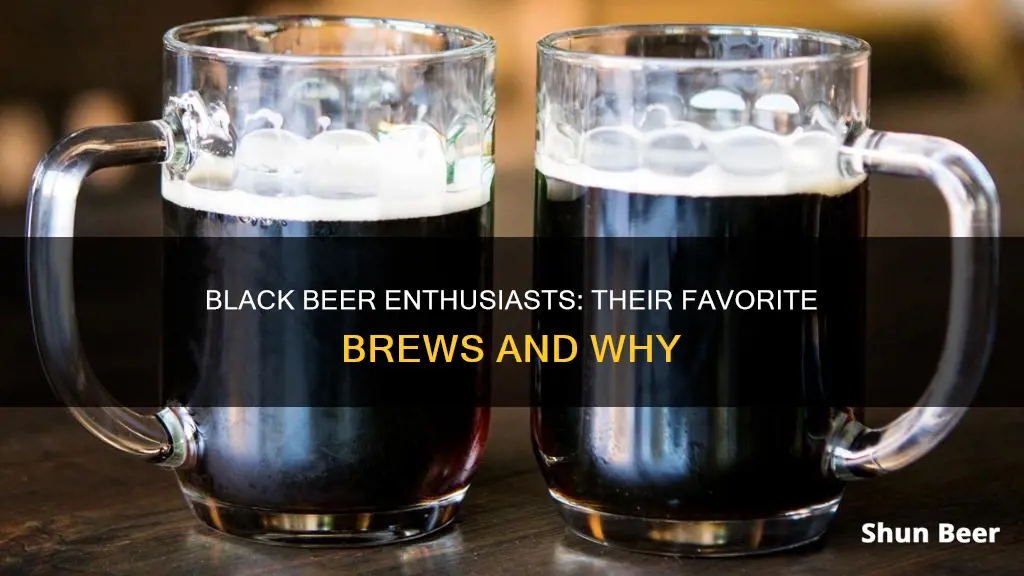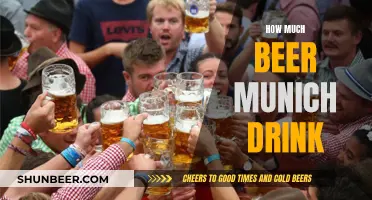
There is a widespread assumption that Black people don't drink beer, and this is reflected in the overwhelmingly white image of beer culture in American pop culture. However, this assumption is false and erases a much longer, far-reaching narrative of Black brewing. While it is true that Black-owned breweries are few and far between, this is largely due to the racism and systematic oppression that Black Americans face when trying to develop their businesses. In addition to economic and cultural reasons, the regional argument also plays a part in the type of beer consumed by Black people.
| Characteristics | Values |
|---|---|
| Percentage of Black-owned breweries in the U.S. | 1% |
| Black-owned breweries | Green Bench Brewing Co., Weathered Souls Brewing, Crowns & Hops, Harlem Brewing Company, Rhythm Brewing Co., Montclair Brewery, 18th Street |
| Beer brands | Sunshine City IPA, Postcard Pilsner, Bench Life, Skyway, Dale Shine, HBCU West Coast, 8 Trill Pils, Skats Stout, Royal Verses, Queen Stout, Rhythm Unfiltered Lager, Rhythm Blue Unfiltered Light Lager, Hava Guava IPA, Candi Crushable Pale Ale |
| Reasons for the lack of Black breweries in America | Racism, years of systematic oppression, economic reasons, social reasons, regional reasons, cultural reasons |
| Percentage of craft beer drank by Black people | 3.7% |
| Average yearly alcohol expenditure for a Black household | $212 |
| Average yearly alcohol expenditure for a white household | $492 |
What You'll Learn

Black-owned beer brands
Black-owned breweries are severely underrepresented in the United States, with less than 1% of craft breweries being Black-owned. However, there are still some excellent Black-owned beer brands to support. Here are some notable Black-owned and Black-led breweries:
Weathered Souls Brewing Co.
Location: San Antonio, Texas
Weathered Souls is led by co-founder and head brewer Marcus Baskerville. In 2020, the brewery initiated the "Black is Beautiful" collaboration, bringing together nearly 1,200 breweries worldwide to raise awareness about the injustices and inequalities Black people face daily. Weathered Souls is known for its deep stouts and thirst-quenching IPAs.
Crowns & Hops
Location: Inglewood, California
Founded by Beny Ashburn and Teo Hunter, Crowns & Hops focuses on closing the racial and gender gaps in the craft beer industry. They brew beers that recognize historically Black colleges and universities and collaborate with other Black-owned businesses. Their diverse portfolio includes pilsners, West Coast IPAs, and more.
Four City Brewing Company
Location: Orange, New Jersey
Founded by Roger Apollon Jr., Four City Brewing Company aims to be a welcoming place for all beer enthusiasts. The microbrewery produces a range of delectable, citrus-forward IPAs and other styles that pay homage to its local community.
Harlem Brewing Company
Location: Harlem, New York
Founded by Celeste Beatty, a pioneer in the brewing industry, Harlem Brewing Company has established three flagship beers: Sugar Hill Golden Ale, Renaissance Wit, and 125 IPA. Beatty has also expanded to a sister brewpub in Rocky Mount, North Carolina, called Harlem Brew South.
Rhythm Brewing Co.
Location: New Haven, Connecticut
Founded by Alisa Bowens-Mercado, Rhythm Brewing Co. focuses on unfiltered craft lagers, inspired by the drink of choice of Bowens-Mercado's grandmothers. Their flagship beer, Rhythm Unfiltered Lager, is brewed with South African hops and offers a crisp, easy-drinking experience.
Métier Brewing Company
Location: Woodinville, Washington
Métier Brewing Company was founded by Rodney Hines with a passion for beer and bicycling. The brewery's mission is "to brew damn good beer and build a stronger community to inspire bigger dreams for all." They source ingredients from minority- and women-owned businesses and offer a range of beers, including a Kölsch, a Coconut Porter, and a Trail Blazer Pale Ale.
These are just a few examples of Black-owned beer brands, and while the number of Black-owned breweries is still disproportionately low, initiatives like the National Black Brewers Association are working to address this disparity and promote diversity in the craft beer industry.
Amtrak's Beer Policy: Can You Drink While Riding?
You may want to see also

The history of Black people drinking beer
Historical Context
Beer has a long and significant history within the Black community, dating back to pre-colonial times. In West African societies, fermentation practices were common, and the production of alcohol was deeply intertwined with cultural and spiritual traditions. This knowledge and skill were carried over to the Americas during the transatlantic slave trade, with records indicating that enslaved Africans were often skilled brewers or involved in the brewing process. Despite this historical connection, the image of beer in American pop culture is often overwhelmingly white, erasing the rich history of Black brewers and their contributions to the craft.
Contemporary Perspectives
In recent times, the relationship between Black Americans and beer, especially craft beer, has been influenced by various factors. One notable aspect is the economic hurdle, as the brewing industry requires significant capital to start and expand, and racial disparities in access to business loans and funding have posed challenges for aspiring Black brewers. Additionally, distribution and marketing practices within the industry have sometimes made it difficult for Black-owned breweries to gain traction.
Regional preferences also play a role, with cultural and climatic factors influencing drinking habits. For example, in the South, lighter beers are generally preferred due to the hotter climate, and there is a strong tradition of drinking familiar, mass-produced beers like Budweiser, Miller, and Coors. Craft beers, which tend to be more expensive, have not always been as widely embraced by the Black community, especially when faced with economic constraints and a history of systematic oppression.
Social and cultural norms also shape drinking habits, and alcohol consumption has sometimes been viewed as a stigma within the Black community, influenced by the strong presence of the Black church. However, it is important to note that these perspectives are not universal, and individual experiences vary greatly.
Black-Owned Breweries Today
Despite the challenges and historical erasure, there are several notable Black-owned breweries and beer brands that are thriving today. For example, the Harlem Brewing Company, founded by Celeste Beatty, is the first brewery in the United States owned by a Black woman. Other notable Black-owned breweries include Green Bench Brewing Co., Weathered Souls Brewing, Crowns & Hops, and Rhythm Brewing Co. Supporting these businesses is crucial to ensuring their success and helping to diversify the brewing industry.
Drinking and Driving in Ontario: One Beer, Safe?
You may want to see also

Why Black people don't drink craft beer
There are several reasons why Black people don't drink craft beer, including economic, social, regional, and cultural factors. Firstly, craft beer tends to be more expensive than regular beer, and people of colour often have lower incomes than their white counterparts. A regular six-pack of craft beer can cost around $20, while a similar amount of a non-craft beer can be purchased for much cheaper. When it comes to alcohol consumption, Black Americans spend considerably less than whites. Between 2010 and 2012, the average Black household spent just $212 a year on alcohol, while whites spent almost twice as much at $492. With craft beer being more expensive, it is understandable that some Black people may opt for cheaper alternatives.
Secondly, there is a historical and cultural stigma associated with alcohol consumption in the Black community. The growth of the African American church promoted abstinence and moderate drinking patterns, influencing the drinking behaviours of Black Americans. Alcohol is sometimes viewed negatively in the community, and brewing alcohol may be seen as even more unacceptable. This stigma may deter Black people from drinking craft beer or any alcohol at all.
Thirdly, the craft beer industry has a history of racism and exclusion. The consolidation of the beer industry into large corporations after Prohibition hurt minority ownership, and the industry has a legacy of discriminating against African Americans in terms of employment. Additionally, Black Americans face hurdles in business development and expansion due to racism and systemic oppression, making it difficult for them to enter the craft beer industry as brewers or bar owners.
Finally, the craft beer culture itself may not be welcoming to Black drinkers. One Black craft beer drinker expressed dislike for the craft beer culture, which they described as exclusionary and pretentious. Craft beer has often been associated with white hipsters and gentrification, creating an image that may not be appealing to Black consumers. Additionally, craft beer bars, restaurants, and stores are often not located in Black neighbourhoods, further reducing accessibility and exposure to craft beer for Black people.
In conclusion, a combination of economic, social, regional, and cultural factors contributes to the lack of craft beer consumption among Black people. While some individuals may simply not prefer the taste of craft beer, the broader issues of racism, exclusion, and cultural stigma play a significant role in the disparity.
Beer and Pizza: A Match Made in Heaven?
You may want to see also

The economic argument for Black people not drinking craft beer
Additionally, economic factors play a significant role in the drinking preferences of Black consumers. Craft beer tends to be more expensive than mainstream beers, with a six-pack of craft beer costing around $20 compared to a 12-pack of Coors or Miller Light at a similar price. People of color often have lower incomes than their white counterparts, making the higher cost of craft beer a significant factor in their purchasing decisions. According to a U.S. Department of Health and Human Services survey in 2013, African Americans reported lower current alcohol use (43%) than whites (57%). This trend is further supported by the U.S. Labor Department, which found that African American households spent significantly less on alcohol annually than white households.
The economic argument also intersects with historical and cultural factors. The history of slavery and the subsequent struggle for equal rights and opportunities have influenced the spending habits of Black Americans. During the abolitionist movement, alcohol was associated with the oppressor, and temperance became intertwined with the fight for emancipation. Even after emancipation, the focus for Black Americans was on education, employment, and property ownership rather than recreational drinking.
Furthermore, the beer industry's marketing strategies have contributed to the economic argument. Macrobreweries have historically neglected to market their core products to a Black demographic. Instead, they have targeted Black consumers with high-ABV malt liquors, which are often perceived as symbols of urban Blackness and community decay. The marketing of premium spirits, such as Hennessy, to Black consumers as symbols of cosmopolitanism and upward mobility has further contributed to the disconnect between Black drinkers and craft beer.
In conclusion, the economic argument for Black people not drinking craft beer is rooted in racial disparities within the industry, income inequalities, historical factors, and targeted marketing strategies. These factors collectively shape the drinking preferences and purchasing decisions of Black consumers, leading to a disconnect between craft beer and the Black community.
Mouthwash and Beer: Effective Mosquito Repellents or Old Wives' Tales?
You may want to see also

The cultural argument for Black people not drinking craft beer
The Black church has played a significant role in shaping the drinking behaviours of African Americans, with religious leaders encouraging abstinence or moderate drinking. Additionally, the lower rates of intoxication and drinking in the Black community have been linked to the influence of the Black church. This cultural and religious context creates a barrier to the adoption of craft beer, which is often associated with higher alcohol content and more frequent consumption.
Furthermore, the cultural argument also intersects with economic factors. Black Americans have historically had lower incomes than their white counterparts, which affects their purchasing power when it comes to craft beer, which tends to be more expensive than mainstream beers. The higher cost of craft beer may deter some Black consumers, especially those with lower incomes, from experimenting with craft beer or making it a regular purchase.
Another cultural factor is the strong association of certain beer brands with the Black community. For example, malt liquor, which is often marketed towards urban audiences and has a high ABV, has been a popular choice within the community. However, this association with a specific type of beer can create a perception that craft beer is not for Black consumers or that it is a "white thing". This perception is reinforced by the predominantly white image of craft beer drinkers and brewers, which can make it challenging for Black people to see themselves represented in the craft beer culture.
Additionally, the history of racism and systematic oppression in the United States cannot be ignored when discussing the cultural argument. While it is not the sole reason for the lack of representation in craft beer consumption and production, it has undoubtedly played a role. Black Americans have faced barriers in business development and expansion due to racism, which has limited their opportunities to enter the craft beer market as producers and influenced their drinking preferences as consumers.
In conclusion, the cultural argument for Black people not drinking craft beer is multifaceted and influenced by historical, social, religious, and economic factors. The stigma associated with alcohol consumption, the influence of the Black church, economic disparities, brand associations, and the predominantly white image of craft beer all contribute to the cultural context that shapes drinking preferences within the Black community.
Beer and Tums: Safe Mix or Not?
You may want to see also
Frequently asked questions
Some Black-owned beer brands include Green Bench Brewing Co., Weathered Souls Brewing, Crowns & Hops Brewing Co., Harlem Brewing Company, Rhythm Brewing Co., Montclair Brewery, and 18th Street.
Black people face significant barriers when trying to start a brewery, including difficulty in obtaining business loans and funding, discrimination within the industry, and exclusionary practices such as unionization and salon culture.
There are several reasons why Black Americans may not drink craft beer, including economic factors, regional preferences, and cultural and social norms. Craft beer tends to be more expensive than other types of beer, and Black Americans have lower incomes and spend less money on alcohol overall. Regional preferences also play a role, with people in the South, for example, favoring lighter beers due to the hotter climate. Additionally, alcohol consumption may be viewed negatively in the Black community due to the influence of the Black church and historical factors.
Some popular beers among Black people include Heineken, Corona, Budweiser, and malt liquor brands such as Colt 45 and Olde English.







